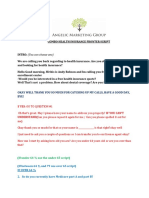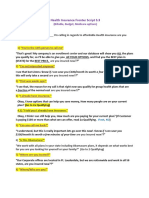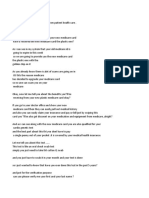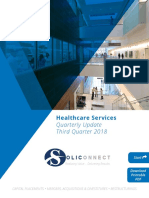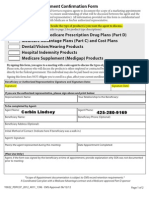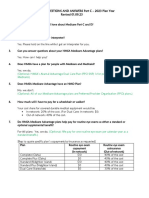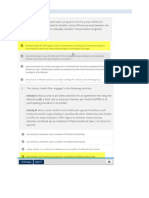MEDICARE SCRIPT
Hi my name is _______ How are you doing today?
Basically, I'm calling you from Medicare Supplement Advisors and reason I'm calling you today is
Medicare plans were recently upgraded in your state and you might be eligible for richer benefits as
you know that it’s a special enrollment period going on so now this is the best time to avail your
medicare benefits. And you are enrolled into Medicare Part A & B?
I have couple of quick qualifying questions.
1- First of all can you tell me do you make any co-payments upon your visit at your primary
doctor or any specialist? YES or NO
2- What about your Medications are you paying any co-pays for your medications? YES or NO
3- Are you getting any additional benefits from medicare like dental, hearing, vision, over the
counter benefits or cashback on your social security every month?
4- Can you please provide me your zip code so that I can see the upgraded benefits available in
your zip-code.
5- And if you don't mind me asking who do I have the pleasure of speaking to?
6- What is your First and Last Name?/May I have your first and last name? If don’t understand
the name you can ask (can you please spell me your first and last name?)
7- Well at your zip code I do see there are couple of benefits available without any additional
cost to you
8- So when it's come to your health are you able to make your decisions yourself or somebody
helps you with that? OR you can ask (Do you make your own related decisions?) Must be YES
9- Just to make sure you are not living in any kind of assisted living facilities Right? If living in
nursing home then ask (You live in a nursing home but you do make your own decisions)
10- May I have your DOB? / Do you mind me asking your DOB? Date of Birth should be 1942 –
1957 means 65 to 79 If above than 1957 means below than 65 You can ask (Do you get your
Medicare Part A & B on Disability) Must be YES
11- Before I connect you with our licensed agent, I just need to confirm Do we have your
permission to transfer this call to the licensed agent Even If your number is listed in any State
or Federal Do Not Call List and You Agree to Waive any TCPA Complaints Onwards, so do you
Agree? If costumer says OK, SURE, OR GO AHEAD then ask (Can you please say YES or I
AGREE on the Disclaimer? (If costumer says what does disclaimer means Or what is TCPA
means the Disclaimer means that your rights are protected from purchasing anything you do
not want to and allow us to connect you with the license agent if you are in a DO NOT CALL
LIST registry) May I have your consent/ so now can you please say YES or I AGREE on the
disclaimer so I can proceed the call) Must be YES or I AGREE
12- Do you have your RED, WHITE & BLUE MEDICARE card available? Must be YES and if NO then
you can ask (Since you don’t have your medicare card available, therefore, our licensed agent
can pull up your medicare profile with the help of your SOCIAL SECURITY NUMBER do know
your SOCIAL by heart?) Must be YES
�SCRIPT REBUTTALS
IF NOT INTERESTED: I am only calling for your Medicare Review; you are under NO OBLIGATION, and
I am sure you will find the information to be extremely valuable. It doesn’t cost you anything, and
with all the options available in Medicare you could be doing yourself a disservice by not going over
your options with a licensed agent.
IF ALREADY ENROLLED: I definitely understand but Medicare rules and plans are constantly
changing. We just want to verify a few things with you to make sure that your plan is the one that
best fits your needs.
WHAT DO YOU MEAN EXTENDED? Extended means there are additional enrollment reasons
available for you to use this year.
ADDITIONAL INFORMATION: Information that includes on how to get access to the different
MEDICARE programs that offer no or low premiums, transportation, dental, vision, prescription
health and fitness programs. I’ll get you connected with a Licensed Agent in your state to debrief
further.
I AM ALREADY SPEAKING WITH AN AGENT: That's great; and with so many Carriers and plan options
available, my job is to make sure that you are enrolled into the plan that is best fit for you. Since we
have a Licensed Health Agent and Senior Health Specialist in your State and appointed with multiple
Carriers, we want to make sure that you are aware of ALL of your options.
I DON’T NEED A REVIEW: I understand. But there may be other options that you aren’t aware of.
That’s why it is best that you speak with a licensed agent in your state. Again. This is only a Medicare
review and you are under NO OBLIGATION. Okay?
(WE ARE PRIVATE INSURANCE COMPANY) WHO ARE YOU? We are a licensed agency. We represent
many A-rated carriers, I will transfer you to a licensed agent who can further assist you.
WRONG NUMBER: We are assigned to give your household a Medicare plan review. Are you
currently on Medicare? Y/N
WHERE ARE YOU LOCATED I am currently working from my home office. But I’ll connect to a
Licensed Agent in your state to discuss further. Okay?
“HOW DID YOU GET MY INFORMATION?” As a Licensed agency, your information was provided to
us for your upcoming enrolment, to make sure that you have all of the information you need to feel
comfortable about your Health options.
I DON’T FEEL COMFORTABLE GIVING OUT MY INFORMATION: I can understand that you always
want to be careful. Please understand that you will be speaking to a licensed agent in your state.
Once you’re connected, they will give you their name and agency name which can be easily verified
on your state's website. Are you currently enrolled in Medicare parts A & B?
I PAY NOTHING FOR MY MEDICARE PLAN Would you like to go over your plan with a licensed agent
to compare other zero-cost options with more possible benefits?
“NOT A GOOD TIME / CALL ME BACK” We can call you back whenever you would like, however the
Medicare process, like most government programs, can be very complicated and lengthy. The earlier
�you speak to an agent in your state, the better off you are. Do you already have Medicare parts A &
B?
“I HAVE GOTTEN TOO MANY CALLS...” I definitely understand and appreciate your patience.
Unfortunately, most of these calls are coming from Agents who work with just one Carrier. Since we
have Licensed Health Agents and Senior Health Specialists in your (State), my job is to make sure that
you have ALL of the information that you need and that you have all of your questions answered.
“JUST (MAIL / E-MAIL) ME SOMETHING…” I understand; and since we have Licensed Agents and
Senior Health Specialists who work with multiple companies, we would not know exactly what to
send you until we go over the options you have—because each person’s situation is unique. Also, I
am sure you are already overflowing with various Senior Health information, right? So, once we go
over some information with you, we will be able to tell you what your best option is.
"[MEDICARE SUPPLEMENT ONLY] I appreciate that; and since Supplement Plans benefits are
standardized, you can shop plans just by the monthly premium --- because the benefits have to be
the same. So, we will just take a quick look at multiple Carriers available to you, and I am sure that if
we can save you $100 OR MORE per year for the exact same plan, it would be worth a few minutes
of your precious time.
�Product Knowledge
MEDICARE
Medicare is an insurance program. Medical bills are paid from trust funds which those covered have
paid into. It serves people over 65 primarily, whatever their income; and serves younger disabled
people and dialysis patients. Patients pay part of costs through deductibles for hospital and other
costs. Small monthly premiums are required for nonhospital coverage. Medicare is a federal
program. It is basically the same everywhere in the United States and is run by the Centers for
Medicare & Medicaid Services, an agency of the federal government.
Who is eligible for Medicare?
Generally, Medicare is available for people age 65 or older, younger people with disabilities and
people with End Stage Renal Disease (permanent kidney failure requiring dialysis or transplant).
Medicare has two parts, Part A (Hospital Insurance) and Part B (Medicare Insurance). You are eligible
for premium-free Part A if you are age 65 or older and you or your spouse worked and paid Medicare
taxes for at least 10 years. You can get Part A at age 65 without having to pay premiums if:
o You are receiving retirement benefits from Social Security or the Railroad Retirement Board.
o You are eligible to receive Social Security or Railroad benefits but you have not yet filed for them.
o You or your spouse had Medicare-covered government employment.
To find out if you are eligible and your expected premium, go the Medicare.gov eligibility tool. If you
(or your spouse) did not pay Medicare taxes while you worked, and you are age 65 or older and a
citizen or permanent resident of the United States, you may be able to buy Part A. If you are under
age 65, you can get Part A without having to pay premiums if:
• You have been entitled to Social Security or Railroad Retirement Board disability benefits for 24
months. (Note: If you have Lou Gehrig's disease, your Medicare benefits begin the first month you
get disability benefits.)
• You are a kidney dialysis or kidney transplant patient.
While most people do not have to pay a premium for Part A, everyone must pay for Part B if they
want it. This monthly premium is deducted from your Social Security, Railroad Retirement, or Civil
Service Retirement check. If you do not get any of these payments, Medicare sends you a bill for your
Part B premium every 3 months.
Who Qualifies for Medicare Advantage?
Generally, Medicare Advantage is available for:
• Senior's age 65 or older
• Younger people with disabilities
• People with end-stage renal disease (permanent kidney failure requiring dialysis or transplant)
With Medicare Advantage plans, you must also be enrolled in Medicare Part A (hospital insurance)
and Part B (Medicare insurance) and reside in the plan’s service area.
�Enrolment only occurs during certain periods, but you cannot be denied coverage due to a
preexisting condition. Specifically, you can join or switch to a Medicare Advantage plan with or
without drug coverage during the following three windows:
• Initial Medicare Enrolment Period: Begins three months before you turn 65 and ends three months
after you turn 65
• Open Enrolment Period: From Oct. 15 to Dec. 7
• Medicare Advantage Open Enrolment Period: Jan. 1 to March 31 annually
What Are the Benefits of Medicare Advantage?
Medicare Advantage plans provide all the same benefits provided by Original Medicare, plus
coverage for items and services not covered by Original Medicare, including some vision, some
dental, hearing and wellness programs like gym memberships. “Some plans even provide
transportation to doctor visits and adult day care services,” says Amanda Baethke, director of
corporate development at Aero flow Healthcare in North Carolina, referring to newly expanded
supplemental benefits. “Plans can also tailor their benefit packages to offer benefits to those who
are chronically ill.” Cigna, for example, launched free COVID-19 vaccination transportation for its
Medicare Advantage customers. Over 500,000 customers (plus their caregivers) in 23 states are
eligible for four one-way trips, up to 60 miles each way, to get a vaccine. Another bonus to consider
is that coverage is expanding. According to a new report commissioned by the Better Medicare
Alliance, the number of Medicare Advantage plans offering Special Supplemental Benefits for the
Chronically Ill (known as SSBCI) rose from 245 plans in 2020 to 845 in 2021. Some of the top new
non-medical benefits offered include:
• Meals
• Non-medical transportation
• Resources addressing social needs
• Pest control
“Overall, Medicare Advantage plans offer convenient coverage options that are largely covered by a
single insurer,” said Baethke. “There is also a sizable cost-saving opportunity.”
What Is Medicare Supplement (Medigap)?
Medicare Supplement plans (commonly known as Medigap plans) are sold by private insurance
companies to help fill the gaps of Original Medicare coverage. In 2018, 34% of people enrolled in
Original Medicare had coverage provided by Medicare Supplement plans to cover some of the costs
of approved services—that’s roughly 11 million people, according to a report from the Kaiser Family
Foundation. There are 10 Medigap plans to choose from—all with letter names ranging from A to N
—that provide standardized coverage and help pay for things like deductibles, coinsurance and
copays. However, Medigap policies don’t cover prescription drugs; you’ll need to purchase a
Medicare Part D plan in addition to a Medicare Supplement plan.
Who Is Eligible for a Medicare Supplement Plan? If you’re turning 65:
“The six-month open enrolment period is a really important time for anyone entering Medicare to
learn as much as they can about the program, what’s covered and their coverage options,” says
Jacobson. The window starts on the first day of the month that you’re 65 or older and enrolled in
�Medicare Part B. For instance, if you turn 65 in July and enroll in Part B that same month, the best
time to buy a Medigap policy is between July and December. “It’s not a very long time, but it’s the
only time when you’re guaranteed to get a Medigap policy without medical underwriting,” Jacobson
says. In other words, it’s better to enroll right from the start because companies cannot deny you
based on a preexisting condition or health problem.
If you’re 65 or older:
If you apply for Medigap coverage after your open enrollment period, there’s no guarantee an
insurance company will sell you a policy. Insurers can:
• Request your medical history as part of the conditions of issuing you a plan
• Refuse to sell you a policy
• Make you wait for coverage to start
• Charge you more If you are under 65: Federal law doesn’t require insurance companies to sell
Medigap policies to people under 65. However, some states require companies to sell policies to
people under the age of 65, although eligibility varies.
What Are the Benefits of a Medicare Supplement Plan?
A Medicare Supplement plan makes your out-of-pocket costs more predictable and easier to budget.
“From a cost-sharing perspective, many people like it because you don’t need to worry about how
much is owed every time you go to the doctor or are hospitalized,” said Jacobson. “You can literally
see any doctor around the country that you would like to see.”
For example, if you live in Arizona, you can fly to Minnesota to go to the Mayo Clinic. Unfortunately,
Jacobson says having this benefit tends to be much more important for people when they’re sicker.
“When people first go on Medicare, they’re usually relatively healthy and not thinking necessarily
about when they’re sick and what type of plan would be best for them in that situation. The inability
to easily switch back and forth between Medicare Advantage and Medicare Supplement makes it
pretty complicated for people,” she says.
For example, if you join a Medicare Advantage plan for the first time and aren’t happy with it, federal
law grants you special rights if you return to Original Medicare within the first 12 months. After that,
you can only disenroll or change plans during the Open Enrolment Period or if you qualify for a
Special Enrolment Period. Depending on the type of Special Enrolment Period, you may or may not
have the right to buy a Medigap policy.
If you’re considering disenrollment from your Medicare Advantage plan and picking up a Medigap
plan, contact the local office of your State Health Insurance Assistance Program.
At the end of the day, the decision often comes down to whether you can afford a Medigap plan, as
they can be more expensive.
Medigap With Nontraditional Benefits: Vision, Dental and Hearing
A recently released analysis from The Commonwealth Fund looks at Medigap plans offering
nontraditional benefits like vision, dental and hearing services that aren’t covered by Original
Medicare [3]. “Our research showed a relatively small share of plans—only 7%—offering these
benefits,” said Jacobson. “I think most people don’t realize there are these plans out there with
benefits comparable to Medicare Advantage.”
�At the federal level, there are tradeoffs in terms of policies encouraging or discouraging these
benefits being offered. The American Dental Association, for example, is currently advocating for a
distinct program to provide comprehensive dental care for low-income older adults—not the
Medicare Part B program that has been part of past and current proposals. “We need comprehensive
oral health coverage in Medicare, as well as hearing and vision,” said Amber Christ, directing attorney
at Justice in Aging, an advocacy organization protecting the rights of low-income older adults.
“Nearly half of Medicare enrollees have no dental coverage at all— that’s 24 million older adults and
people with disabilities who have no coverage.”
What Is Medicare Advantage?
Medicare Advantage (also known as Part C) plans are provided by private insurers and essentially
replace Original Medicare as your primary insurance. They cover all Medicare-covered benefits and
may also provide additional benefits like some dental, hearing, vision and fitness coverage.
Most of them also include Part D, which covers prescription drugs. “Your choice of doctors and
hospitals is more restricted under Medicare Advantage, and you may be required to get different
authorizations for care,” says Jacobson. “Private insurers have the ability to manage your use of care
in different ways, and this is the big trade-off,” compared to Original Medicare.
The average person on Medicare has over 30 Medicare Advantage plans to choose from—including
health maintenance organizations (HMOs), preferred provider organizations (PPOs), private fee-for-
service (PFFS) plans and special needs plans (SNPs). You’ll likely have a lot of choices to sort through,
but not all types of plans are available in all area.
Medicare Advantage Medicare Supplement
$0 deductible for many plans, no copay Predictable monthly payments (But can
for a primary doctor, low copays for be expensive)
specialists Plans K and L have annual out-of-
Restricted choice of providers, hospitals pocket limits
and suppliers Small percentage of plans offer
One-stop-shop coverage, but must also nontraditional benefits like hearing,
be enrolled in Medicare Part A and Part dental and vision
B International travel coverage
Most policies include Part D Must also be enrolled in Medicare Part
prescription drug coverage, as well as A and Part B
some vision, hearing, dental and fitness Policies don’t cover prescription drugs,
benefits so must enroll in Part D separately
Some plans offer out of network Only covers one person— spouses must
provider coverage buy separate coverage
In-depth: HMOs
HMO stands for Health Maintenance Organization. A Health Maintenance Organization is a network
of doctors, hospitals and other health care providers who agree to provide care at a reduced rate. To
keep costs low, HMOs may require you to select a primary care physician (sometimes called a
primary care provider or PCP), who can refer you to specialists when needed.
An HMO plan will only pay for care from health care providers in the HMO network, except for
emergency care, which may be covered out-of-network. Lab work, such as a blood draw, or a urine
test, is also limited to one laboratory provider covered by the HMO network.
�HMO plans are generally less expensive than PPO plans, with lower monthly payments, making them
ideal if your favorite doctors are already in the network, or if you receive most of your care close to
home.
In-depth: PPOs
PPO stands for Preferred Provider Organization. Like an HMO, a Preferred Provider Organization is a
network of doctors, hospitals and health care providers who agree to provide care at a certain rate.
Unlike an HMO, you are not limited to providers who are in -network, though your copay or out-of-
pocket cost for out-of-network visits may be higher than for in-network providers.
PPO plans typically require higher monthly payments in exchange for increased flexibility. With a
PPO, you do not need to maintain a primary care physician, and can see a different doctor of your
choice at any time, including specialists. This also means when you are traveling, you can receive care
wherever you are.
Additionally, PPO plans offer more options for laboratory service providers. When you need lab work
done, you can choose the most convenient location under a PPO Network.
HMO vs. PPO HMO PPO
Lower out-of-pocket costs, X
premiums, and deductibles
Need to go through a primary X
care physician
Can receive at least limited X
coverage with an out-of-
network provider
Can receive at least limited X
coverage for prescriptions at
any pharmacy
Provider or policyholder must X
file a claim to receive payment
of benefits

















